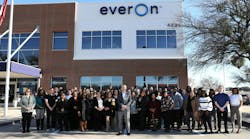NEWARK, N.J. Oct. 29 /PRNewswire/ -- Keeping violence out of the workplace naturally is a top priority for employers everywhere. But as more states pass laws giving employees the right to bring guns onto company parking lots, many managers now feel caught in the proverbial crossfire, writes James P. Anelli, a Newark-based attorney in LeClairRyan's Labor and Employment Group in a new article.
In the article, written for Human Resource Executive Online ( http://www.hreonline.com/ ), Anelli outlines the growing and legally controversial trend among state legislatures to pass laws that actually prevent employers from keeping guns out of workplace parking lots. It is a fascinating twist on a familiar controversy, the attorney writes in the article, titled "Firearms at Work," Indeed, he notes, states that have passed such legislation now include Georgia, Florida, Oklahoma, Alaska, Kentucky, Mississippi, Kansas and Minnesota, and similar laws are under consideration in the statehouses of Alabama, Louisiana, Montana, Tennessee, Utah and Virginia.
The aim of these laws, typically introduced by pro-gun lawmakers and supported by the National Rifle Association, is to enable employees to exercise their constitutional right to possess and carry firearms. But the statutes create a difficult dilemma for company executives who are legally charged with maintaining workplace safety, Anelli notes. Employers, for example, must follow strict workplace safety guidelines issued by the U.S. Occupational Safety and Health Administration (OSHA). Yet legal opinion is divided on whether these new state laws conflict with OSHA's general safety requirements. In October 2007, for example, a federal judge issued an injunction against the enforcement of Oklahoma's aforementioned legislation. The ruling agreed with the employer group arguments that the new laws created an obstacle to meeting OSHA's requirement to maintain a safe workplace.
Given this legal ambiguity, Anelli says, company executives in states that have passed such laws might make a critical mistake -- concluding that they have been relieved of their obligation to keep the workplace, including its parking lot, safe. "It is important, despite such laws, to work very closely with security professionals, attorneys, and local law enforcement officials in defusing situations involving potential violence and the possible use of firearms," writes the veteran attorney.
Anelli spells out concrete steps executives can take to protect their companies from liability -- and to better protect their employees from workplace violence despite the pro-gun laws. Some types of businesses, for example, may have been legally exempt from the applicable laws, which vary widely from state to state, and can therefore continue enforcing parking lot gun bans. Others might be able to carve out "secured parking areas" that are gun-free but still in compliance with their states' laws. None of the laws, the attorney emphasizes, protects employees from coming into the actual workplace with a gun. Employers are free to keep firearms out of the company building, and they should continue to watch closely for employee behavior suggestive of possible violence.
Anelli's article also provides several tips on how concerned employers, should they choose to do so, might work with other businesses to fight this type of legislation, and how they can monitor the shifting legal landscape for changes that will affect their own workplace safety responsibilities.
"It is inevitable that OSHA will eventually have to act on this issue, either directly or indirectly, when business groups obtain rulings enforcing OSHA's general safety requirements and enjoining the enforcement of these laws," Anelli writes. "In the final analysis, while some employers' groups have said that the days of the Wild West are returning, it seems more likely that these issues will soon be 'played out' in the courts."
About James P. Anelli
James P. Anelli is an attorney with 20 years of experience representing management in employment discrimination and labor litigation. Formerly with the United States Department of Justice, he is a shareholder in LeClairRyan's Labor and Employment Group in Newark, N.J.
About LeClairRyan
A uniquely-structured, business-minded law firm, LeClairRyan specializes in developing legal solutions to its clients' business challenges. Founded in 1988, LeClairRyan provides business counsel and client representation in corporate law and high-stakes litigation. With offices in California, Connecticut, Massachusetts, Michigan, New Jersey, New York, Pennsylvania, Virginia and Washington, D.C., the firm has more than 300 attorneys representing a wide variety of clients throughout the nation. For more information about LeClairRyan, visit http://www.leclairryan.com/ .


